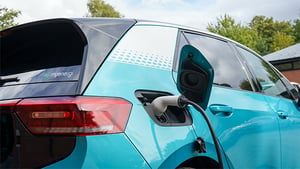
NADA EV Tax Update: December 2023
Changes Starting in 2024: Some Vehicle Criteria for 30D Electric Vehicle (EV) Tax Credits
PARTNER SPOTLIGHT
Dealer Management System, Computer Technology, Media/Advertising, Automotive Auction, F & I/Aftermarket Products, Automotive Technology Training & Compliance
 A NHADA Gold PARTNER
A NHADA Gold PARTNERComputer Technology, Automotive Shop Equipment, Environmental Services
 A NHADA Platinum PARTNER
A NHADA Platinum PARTNERF & I/Aftermarket Products, Automotive Technology Training & Compliance, Environmental Services
.png?width=150&name=corp_logo_horz_on_light_with_trademark_symbol_1200w%20(002).png) A NHADA Diamond PARTNER
A NHADA Diamond PARTNERThe Issue: On Dec. 1, 2023, the IRS released proposed guidance on clean vehicle (EV) tax credits under section 30D of the Internal Revenue Code that may limit the availability of EV tax credits come Jan. 1, 2024.
For an EV to be eligible for up to $7,500 in 30D tax credits, it must meet certain criteria. Some of these criteria don’t change year after year, such as the MSRP caps or battery capacity requirements. But others do, such as the percentage requirements for North America- or free trade partner-sourced battery components and critical minerals which increase year over year for several years.
In addition, beginning in 2024, to remain eligible for 30D credits, an EV’s battery components cannot be sourced from “foreign entities of concern” (that is, entities unduly tied to China, Iran, North Korea, and Russia). Importantly, it is now clear that to be eligible for a tax credit, a qualifying EV must meet the requirements for the year in which the vehicle is delivered to the customer, not delivered to dealers.
What does this mean for dealers?
- Some tax-credit-eligible EVs that are currently on dealers’ lots could cease being eligible for either half ($3,750) or the full ($7,500) tax credit in 2024; these “stranded” vehicles effectively could become more expensive at the stroke of midnight on New Year’s Eve.
- Some vehicles that are currently on dealers’ lots and that are eligible for tax credits in both 2023 and 2024 may nonetheless not be recertified by OEMs by Jan. 1, 2024. If this occurs, those vehicles will not be able to be processed through the new IRS portal for tax credits until that recertification comes in.
The problem is occurring for two reasons:
- First, the government declined to use the year that OEMs delivered vehicles to dealers to determine EV tax credit eligibility.
- Second, the government waited until the last minute to issue lengthy guidance regarding foreign-sourcing requirements to the OEMs for 2024.
As a consequence, the OEMs are now racing to verify supplier compliance with the foreign entity restrictions, research VINs, and recertify eligible VINs for sales after Jan. 1, 2024, and those recertifications may not be completed by the new year.
The takeaway: The scope of the problem is unknown and how fast OEMs will be able to recertify eligible vehicles is also unknown. What we do know is:
- Not all vehicles that are currently on dealers’ lots and that are currently eligible for 30D tax credits in 2023 will remain eligible for tax credits in 2024.
- Even with respect to those vehicles that will still qualify for EV tax credits in 2024, it is very likely that on Jan. 1, the number of VINs that are eligible for 30D tax credits ($3,750 or $7,500) on the IRS portal will be exceedingly low as OEMs race to recertify currently eligible vehicles under the more stringent requirements.
Dealers should consult their manufacturer for brand-specific guidance regarding individual vehicle eligibility for the 30D tax credit.
Yes but: The foregoing issues will not affect 45W commercial clean vehicle tax credits, which is the credit used by lenders to fund EV lease incentive programs. There is, however, a potential separate issue regarding the viability of 45W credits for leasing in 2024. This latter issue is technical, and NADA is advocating the administration vigorously to continue the viability of this tax credit. We expect guidance on this issue by the end of the year, and we will keep our members posted.
Also of note: NADA has a compliance page on how to create electronic clean vehicle sales reports and facilitate the advance payment of tax credits for eligible clean vehicle sales that occur after Dec. 31, 2023. You can find it at nada.org/ev-incentives. You can watch the webinar here.


















.png?width=150&name=Ally_Final%20Logos%20and%20Pairings_11.14.2018-01%20(2).png)


-2.png?width=150&name=Wipfli%20Logo%20Blue%20RGB%20(1)-2.png)


.jpg?width=150&name=NHADA_Partner_FTR_Img_NHADA_Insurance%20(1).jpg)


.jpg?width=150&name=NHADA_Partner_FTR_Img_JMA(1).jpg)


